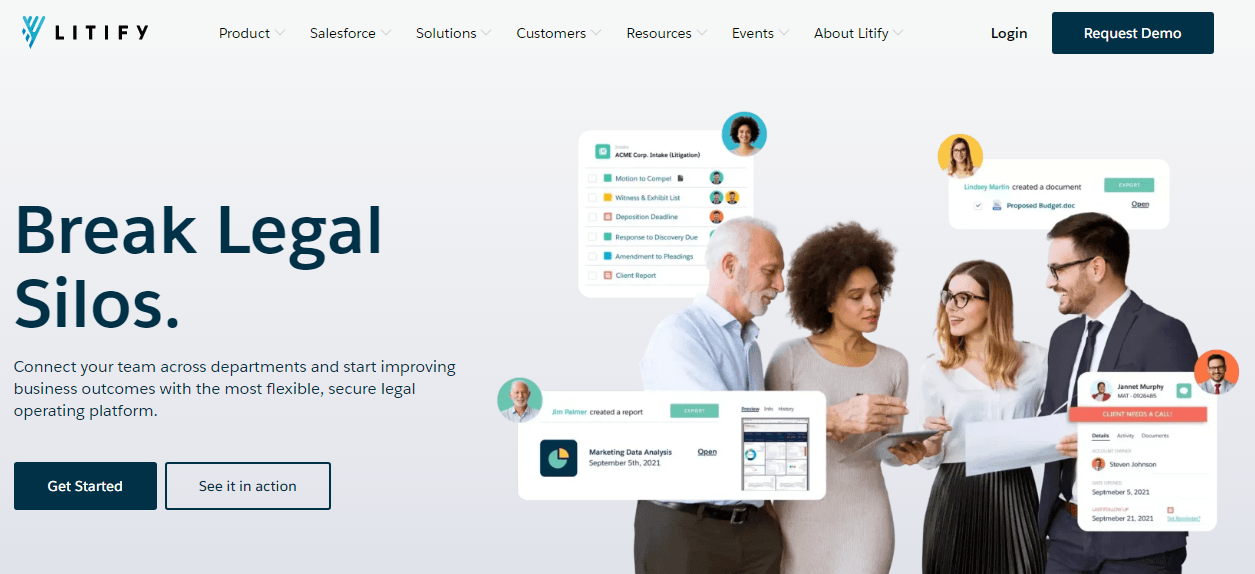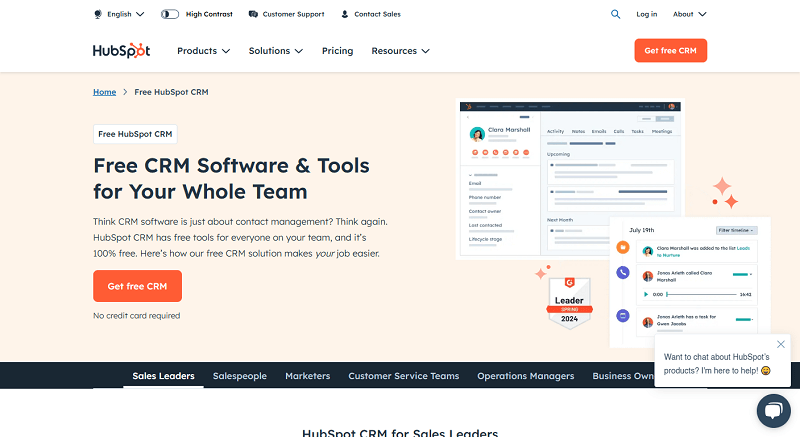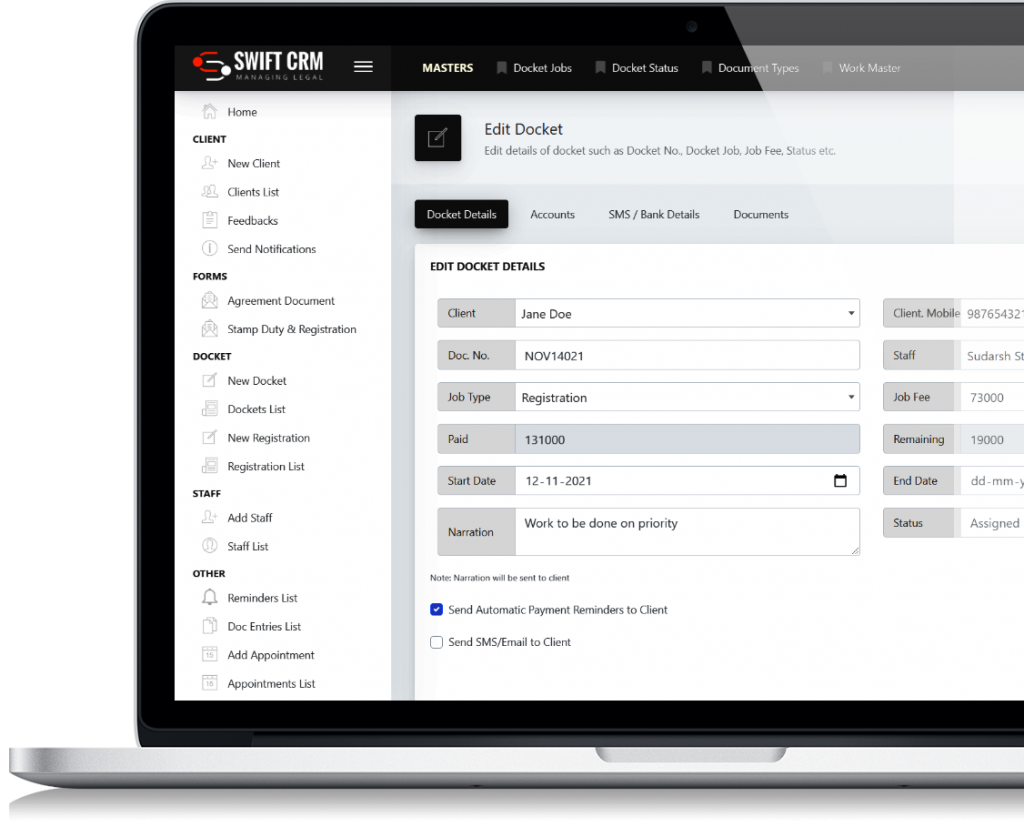Unlocking Efficiency: The Best CRM Systems for Small Law Firms in 2024

Unlocking Efficiency: The Best CRM Systems for Small Law Firms in 2024
In the fast-paced world of law, staying organized and connected is crucial. For small law firms, this is especially true. You’re juggling clients, cases, deadlines, and mountains of paperwork – all while trying to grow your business. That’s where a Customer Relationship Management (CRM) system steps in, acting as your central hub for all client-related information and processes. Choosing the right CRM can be the difference between struggling to keep your head above water and thriving in a competitive market. This comprehensive guide delves into the best CRM systems tailored for small law firms in 2024, exploring their features, benefits, and how they can transform your practice.
Why Your Small Law Firm Needs a CRM
You might be thinking, “Do I really need a CRM?” The answer, for most small law firms, is a resounding yes. Here’s why:
- Enhanced Client Management: A CRM centralizes all client information – contact details, communication history, case notes, billing information, and more – in one accessible location. This means no more hunting through scattered emails, spreadsheets, or paper files.
- Improved Communication: CRMs streamline communication by allowing you to track all interactions with clients, send automated emails, and manage follow-ups. This ensures that no client slips through the cracks and that you maintain consistent communication.
- Increased Efficiency: By automating tasks like appointment scheduling, document generation, and billing, a CRM frees up your time to focus on what matters most: practicing law and serving your clients.
- Better Organization: CRMs provide a structured system for managing cases, deadlines, and tasks. This helps you stay organized, avoid missed deadlines, and reduce the risk of errors.
- Boosted Revenue: By improving client relationships, streamlining processes, and tracking leads, a CRM can help you generate more business and increase your revenue.
- Data-Driven Decisions: CRMs provide valuable insights into your client base, marketing efforts, and overall business performance. This data allows you to make informed decisions about how to grow your firm.
Key Features to Look for in a CRM for Law Firms
Not all CRMs are created equal. When choosing a CRM for your small law firm, consider these essential features:
- Contact Management: The ability to store and manage client contact information, including names, addresses, phone numbers, email addresses, and other relevant details.
- Case Management: Features to track case details, deadlines, documents, and related information.
- Communication Tracking: Tools to record and track all communication with clients, including emails, phone calls, and meetings.
- Document Management: Integration with document storage and management systems for easy access to client files.
- Calendar and Scheduling: Features for scheduling appointments, managing deadlines, and coordinating activities.
- Billing and Invoicing: Integration with billing and invoicing software to streamline financial processes.
- Reporting and Analytics: Tools to generate reports on client data, case progress, and business performance.
- Workflow Automation: The ability to automate repetitive tasks, such as sending follow-up emails or generating documents.
- Security and Compliance: Robust security features to protect client data and ensure compliance with legal regulations.
- Integration with Other Tools: Seamless integration with other software you use, such as email marketing platforms, legal research tools, and accounting software.
Top CRM Systems for Small Law Firms in 2024
Here’s a look at some of the best CRM systems specifically designed or well-suited for small law firms, along with their strengths and weaknesses:
1. Clio Manage
Overview: Clio Manage is a leading practice management software that includes robust CRM features. It’s specifically designed for law firms and offers a comprehensive suite of tools to manage all aspects of your practice.
Key Features:
- Client intake and onboarding
- Contact management
- Case management
- Document management
- Time tracking and billing
- Reporting and analytics
- Client portal for secure communication
- Integrations with other legal tech tools
Pros:
- Comprehensive features specifically designed for law firms
- User-friendly interface
- Excellent customer support
- Robust integrations
Cons:
- Can be more expensive than some other options
- May have a steeper learning curve for some users
2. PracticePanther
Overview: PracticePanther is another popular legal practice management software that includes strong CRM capabilities. It’s known for its ease of use and focus on automation.
Key Features:
- Client intake and onboarding
- Contact management
- Case management
- Document management
- Time tracking and billing
- Workflow automation
- Client portal
- Integrations with other legal tech tools
Pros:
- User-friendly interface
- Strong automation features
- Good customer support
- Competitive pricing
Cons:
- Some advanced features may be limited compared to Clio
- Reporting capabilities could be more extensive
3. Lawmatics
Overview: Lawmatics is a CRM and marketing automation platform specifically built for law firms. It focuses on lead generation, client intake, and client relationship management.
Key Features:
- Lead tracking and management
- Client intake forms and workflows
- Email marketing automation
- Appointment scheduling
- Client portal
- Reporting and analytics
- Integrations with other legal tech tools
Pros:
- Strong focus on marketing and lead generation
- Automated workflows for client intake
- User-friendly interface
- Excellent for firms looking to grow their client base
Cons:
- May not be as robust for case management as Clio or PracticePanther
- Can be more expensive than some CRM-focused options
4. ZOHO CRM
Overview: While not specifically designed for law firms, ZOHO CRM is a versatile and affordable CRM system that can be customized to meet the needs of a small law practice. It offers a wide range of features and integrations.
Key Features:
- Contact management
- Lead management
- Sales automation
- Workflow automation
- Reporting and analytics
- Integrations with other tools
Pros:
- Affordable pricing
- Highly customizable
- Wide range of features
- Strong integrations
Cons:
- Requires more customization to fit the specific needs of a law firm
- May not have legal-specific features
- Customer support can be variable
5. HubSpot CRM
Overview: HubSpot CRM is a free (with paid upgrades) CRM platform that is popular for its ease of use and marketing automation capabilities. While not specifically for law firms, it can be a good option for smaller practices looking for a free or low-cost solution.
Key Features:
- Contact management
- Deal tracking
- Email marketing
- Sales automation
- Reporting and analytics
- Free version available
Pros:
- Free version available
- User-friendly interface
- Strong marketing automation features
- Good for lead tracking
Cons:
- Not specifically designed for law firms
- Limited features in the free version
- May require more customization for legal-specific needs
Choosing the Right CRM: A Step-by-Step Guide
Selecting the right CRM is a process. Here’s a structured approach to help you make the best decision for your small law firm:
- Assess Your Needs: Before you start looking at CRMs, take the time to understand your firm’s specific needs and goals. What are your pain points? What processes do you want to improve? What features are most important to you?
- Define Your Budget: Determine how much you’re willing to spend on a CRM. Consider both the upfront costs and the ongoing monthly fees.
- Research CRM Options: Explore the different CRM systems available, focusing on those that are specifically designed for law firms or have features that are relevant to your practice. Read reviews, compare features, and look for case studies of other law firms that have used the CRM.
- Create a Shortlist: Narrow down your choices to a shortlist of 2-3 CRM systems that seem like the best fit for your needs.
- Request Demos and Trials: Contact the vendors of your shortlisted CRMs and request demos or free trials. This will allow you to test the software and see how it works in practice.
- Evaluate User-Friendliness: Pay close attention to the user interface and ease of use. The CRM should be intuitive and easy for your team to learn and use.
- Consider Integration: Make sure the CRM integrates with the other software you use, such as your email marketing platform, legal research tools, and accounting software.
- Evaluate Customer Support: Check the vendor’s customer support options and response times. Reliable customer support is essential if you encounter any issues.
- Check Security and Compliance: Ensure the CRM has robust security features to protect client data and complies with all relevant legal regulations. Look for features like data encryption, secure data storage, and regular security audits.
- Make a Decision: Based on your research, testing, and evaluation, choose the CRM that best meets your needs and budget.
- Implement and Train: Once you’ve chosen a CRM, implement it and train your team on how to use it effectively. Provide ongoing training and support to ensure everyone is comfortable using the system.
Tips for Successful CRM Implementation
Implementing a CRM is a significant undertaking. Here are some tips to ensure a smooth transition and maximize your success:
- Get Buy-In from Your Team: Involve your team in the decision-making process and get their buy-in. This will help ensure that they are invested in using the CRM.
- Clean Up Your Data: Before importing your data into the CRM, take the time to clean it up. Remove any duplicates, correct errors, and ensure that the data is accurate and complete.
- Customize the CRM: Tailor the CRM to your firm’s specific needs and workflows. Configure the system to track the information that is most important to you.
- Provide Comprehensive Training: Offer thorough training to your team on how to use the CRM effectively. Provide ongoing support and resources to help them master the system.
- Monitor and Evaluate: Regularly monitor the CRM’s performance and evaluate its effectiveness. Make adjustments as needed to optimize its use.
- Integrate Gradually: Don’t try to implement all features at once. Start with the most important features and gradually add more as your team becomes comfortable with the system.
- Set Clear Expectations: Clearly define your expectations for how the CRM will be used and what results you expect to achieve.
- Use the CRM Consistently: Encourage your team to use the CRM consistently for all client-related activities. This will help ensure that you have a complete and accurate view of your client data.
- Stay Up-to-Date: Keep up with the latest updates and features of your CRM. Vendors regularly release new features and improvements.
- Seek Expert Help: If you’re struggling with implementation or customization, consider hiring a consultant or expert to help you.
The Benefits of a Well-Implemented CRM for Your Law Firm
The advantages of a well-chosen and properly utilized CRM system for a small law firm are numerous and can significantly impact the firm’s success. Here’s a deeper look at some of the key benefits:
- Enhanced Client Relationships: A CRM allows you to personalize your interactions with clients, understand their needs, and provide better service. By tracking communication history, you can recall past conversations, address concerns effectively, and demonstrate that you value their business. This level of personalized attention fosters stronger client relationships, leading to increased loyalty and referrals.
- Improved Lead Management: A CRM helps you track leads from initial contact to conversion. You can easily capture lead information, nurture leads through targeted marketing campaigns, and prioritize the leads most likely to convert into clients. This streamlined approach to lead management increases your chances of securing new business.
- Increased Efficiency and Productivity: CRM systems automate many time-consuming tasks, such as scheduling appointments, sending follow-up emails, and generating documents. This frees up your time to focus on more important activities, such as practicing law and serving your clients. Automation also reduces the risk of errors and ensures that tasks are completed consistently.
- Better Collaboration and Communication: A CRM provides a centralized platform for all client-related information, making it easier for your team to collaborate and communicate effectively. Everyone on your team has access to the same information, which eliminates confusion and ensures that everyone is on the same page.
- Improved Data Analysis and Reporting: CRM systems provide valuable insights into your client base, marketing efforts, and overall business performance. You can generate reports on key metrics, such as client acquisition costs, client retention rates, and revenue per client. This data allows you to make informed decisions about how to grow your firm and improve your profitability.
- Enhanced Security and Compliance: Reputable CRM systems offer robust security features to protect client data and ensure compliance with legal regulations. This includes features like data encryption, secure data storage, and regular security audits. By using a CRM, you can reduce the risk of data breaches and ensure that you are meeting your ethical and legal obligations.
- Scalability and Growth: A CRM is a scalable solution that can grow with your firm. As your firm grows, you can add more users, store more data, and take advantage of more advanced features. This allows you to adapt to changing business needs and continue to provide excellent service to your clients.
Conclusion: Choosing the Right CRM is an Investment in Your Future
In today’s competitive legal landscape, a CRM system is no longer a luxury but a necessity for small law firms striving for success. By centralizing client information, streamlining processes, and improving communication, a CRM can help you enhance client relationships, increase efficiency, and boost your bottom line. The key is to choose the right CRM that aligns with your firm’s specific needs and goals and to implement it effectively. By taking the time to research your options, evaluate different systems, and train your team, you can unlock the full potential of a CRM and transform your small law firm into a well-oiled, client-focused machine. The right CRM system is an investment in your firm’s future, paving the way for sustainable growth and long-term success. Don’t delay – take the first step towards a more organized, efficient, and profitable law practice today.




